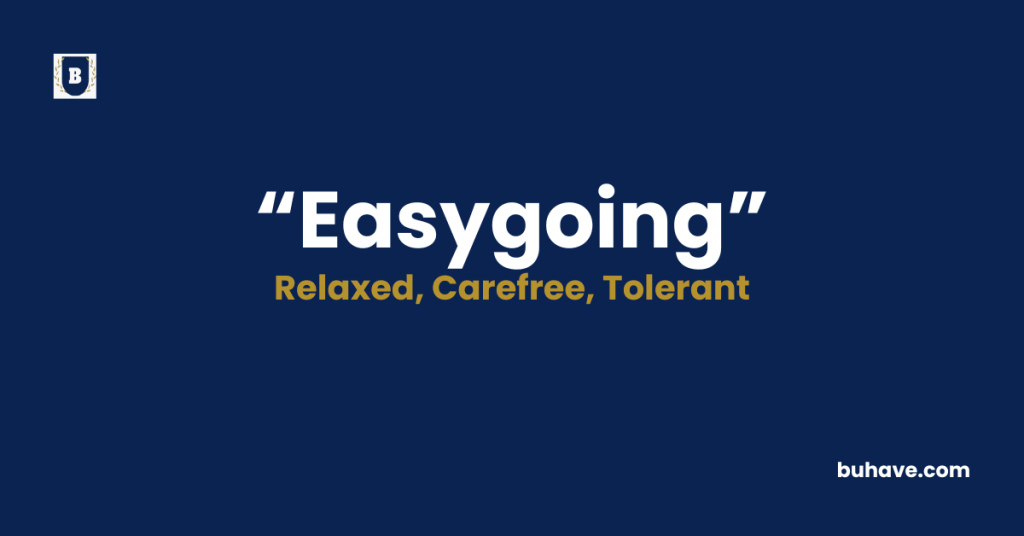The word ‘Easygoing’ (Adjective) describes a person who stays calm, relaxed, and friendly, especially in situations that might upset others. In everyday life, easygoing people tend to avoid conflict. in this guide, you’ll learn the full definition, synonyms, antonyms, etymology, and real-life examples of how to use ‘Easygoing’ correctly in sentences.
Easygoing Explained in Depth
A complete and detailed guide to the words Easygoing including meaning, definition, examples, etymology, synonyms, and antonyms.
Meanings of Easygoing
Easygoing describes a person who stays calm, relaxed, and friendly, especially in situations that might upset others. In everyday life, easygoing people tend to avoid conflict, and instead, they choose to go with the flow. Furthermore, they usually handle stress with patience and don’t get angry easily. When problems arise, they often smile, take a deep breath, and move forward without creating tension. As a result, others enjoy being around them because they bring a peaceful and positive energy into conversations and group settings.
In short, an easygoing person keeps things simple and stays emotionally balanced, even when life gets complicated.
Definition:
Easygoing describes someone who stays relaxed, patient, and calm, even in stressful or difficult situations. Instead of reacting with anger or frustration, this person usually keeps a peaceful attitude and handles problems with flexibility. Moreover, an easygoing person often avoids arguments, listens well, and accepts others without harsh judgment. In daily life, people often describe someone as easygoing when they don’t stress over small things and make others feel comfortable.
Therefore, this word highlights a personality that brings ease, comfort, and a sense of calm to interactions and environments.
Etymology:
The word “easygoing” comes from two simple English words: “easy” and “going.” First, the word “easy” developed from the Old French word aisié, which meant comfortable or at ease. That French word came from the Latin root adjacēns, which meant lying close or convenient. Meanwhile, the word “going” comes from the verb go, which has Old English roots in the word gān, meaning to move or proceed.
By the late 19th century, English speakers began to combine “easy” and “going” to describe a person’s relaxed and calm behavior. As people started using the term more frequently, it became associated with a specific personality type—someone who handles life smoothly, without stress or resistance. Over time, “easygoing” became a single compound adjective used widely in both formal and informal conversation.
Example Sentence:
- Although the project deadline was tight, Emma remained easygoing and calmly encouraged the team to stay focused.
- During group trips, people usually appreciate Mark’s easygoing nature because he adapts to plans without complaining.
- Sarah brings an easygoing attitude to work, so her coworkers often turn to her when tensions rise.
- Even when the restaurant messed up his order, James stayed easygoing and kindly asked for a correction.
- Because of her easygoing personality, everyone in the class felt comfortable talking to her.
Easygoing Synonyms:
- Relaxed
- Carefree
- Unconcerned
- Chill
- Mellow
- Tolerant
- Patient
- Good-natured
- Flexible
Easygoing Antonyms:
- Stressed
- Tense
- Uptight
- Anxious
- Rigid
- Demanding
- Inflexible
- High-strung
- Grumpy
FAQs about Easygoing
Here’s a FAQ-style guide about the word “Easygoing”
1. What does “easygoing” mean?
“Easygoing” is an adjective that describes someone who is:
- Relaxed and tolerant
- Not easily upset, stressed, or annoyed
- Calm, laid-back, and accepting of others or situations
2. How is “easygoing” used in a sentence?
- “He’s such an easygoing person—it’s hard to make him angry.”
- “Her easygoing nature makes her a great team player.”
- “They’re an easygoing couple who go with the flow.”
3. What are some synonyms for “easygoing”?
- Laid-back
- Chill
- Relaxed
- Carefree
- Tolerant
- Untroubled
4. Is “easygoing” a positive trait?
Yes, in most cases. Being easygoing is seen as a strength in social, professional, and personal situations because it suggests:
- Emotional stability
- Patience
- Adaptability
However, in some cases, it can be misinterpreted as a lack of drive or assertiveness.
5. Can “easygoing” describe a lifestyle or environment?
Yes. “Easygoing” can be used to describe not just people, but also:
- Atmospheres (“an easygoing work culture”)
- Events (“an easygoing get-together”)
- Styles or approaches (“an easygoing parenting style”)
**6. What is the opposite of “easygoing”?
- Uptight
- Stressed
- Rigid
- Inflexible
- High-strung
- These words describe people who may be more tense, demanding, or anxious.
7. Is “easygoing” one word or two?
It’s most commonly written as one word: “easygoing.”
However, in older or more formal writing, you might see it hyphenated: “easy-going.

















